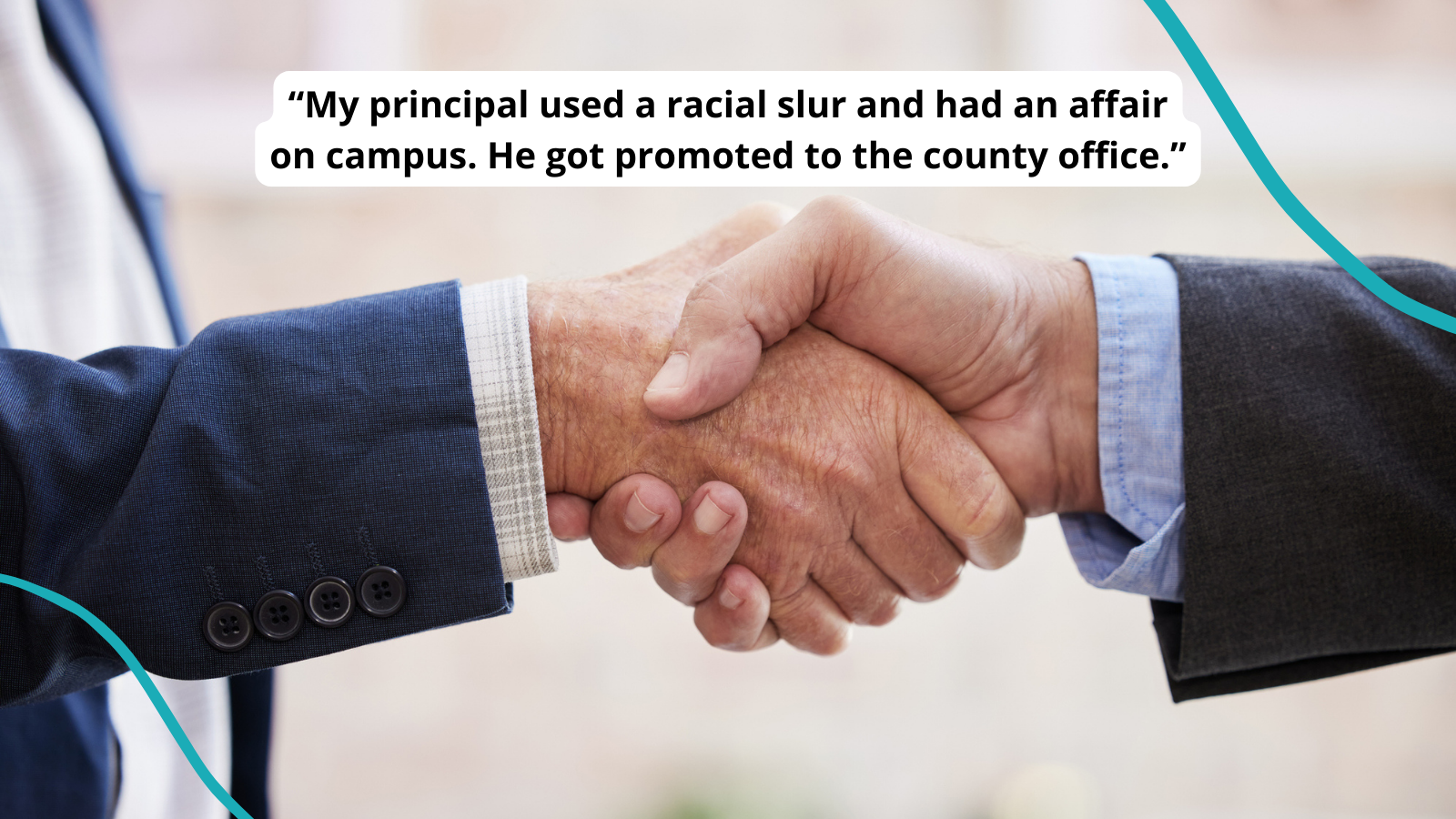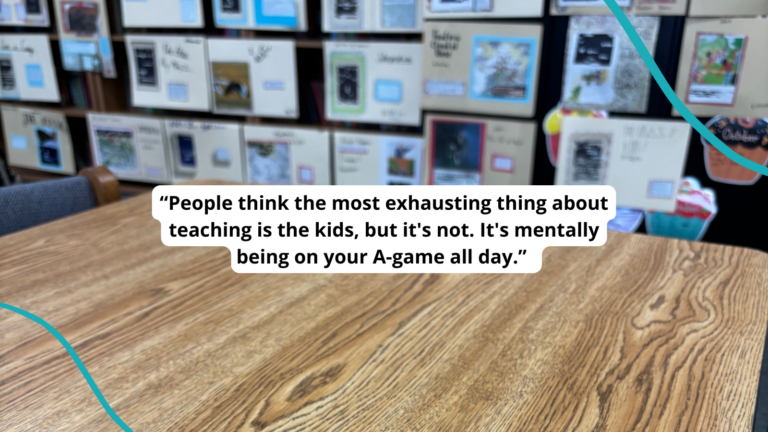In my first district, my coworkers and I watched it play out so many times. We could practically set our watches to it. If an employee did something bad and our principal didn’t like them, they’d be fired, demoted, or retaliated against. But if a district “darling” did something bad—teacher, AP, principal—it was only a matter of time before they’d be promoted to a higher-paying position in central administration. Instead of punishment, they’d get promoted. In other words, failing upward.
What is “failing upward”?
Traditionally, failing upward is the idea that someone succeeds in their career despite being mediocre at their job. Certainly, this happens in every field and profession.
But in this case, we’re not talking about being mediocre. We’re talking about employees breaking serious rules, creating hostile work environments, and engaging in seriously unethical behavior. Instead of being removed from their position after an investigation, they get reassigned or, worse, promoted to a higher-paying job in central administration.
Stories from teachers
Recently, I asked teachers from across the country to tell me their stories of administrators or teachers failing upward. I thought maybe I’d just hear from other districts like H.I.S.D., districts that grew too large and lost oversight of their employees.
Nope.
I heard from teachers in rural schools, suburban schools, small districts, large districts, wealthy schools, Title I schools, nearby districts practically in my backyard, and others across the country. Some even from other countries.
Failing upward is everywhere.
I will keep all these teachers anonymous for obvious reasons, but here are their stories.
Sexual activity and harassment
Far too many teachers told me about principals, assistant principals, administrators, and teachers caught engaging in sexual activity on campus with people in their chain of command—and who were promoted to higher-paying positions in the district as a result. Other teachers wrote in about sexual harassment or retaliation after spurned advances. Here are just a handful of stories from teachers:
- “Off the top of my head, I can think of four situations involving principals in our district who were caught on campus (one in the parking lot) having sex with teachers or staff members. I doubt it will surprise you that no one lost their job, one principal is now superintendent, and the other three work in central administration.”
- “This was a principal in my district! He was reassigned. Twice.”
- “A principal and AP at the same high school—both married to different people—were caught multiple times having an affair on campus. Instead of any kind of discipline, the AP was promoted to principal of a high-performing school in the district and the principal was made associate superintendent. Everything was swept under the rug. Both still work in the district.”
- “When I was teaching, my AP made multiple advances toward me, even promising me an AP position if I slept with him. I reported it and nothing happened because there were no witnesses. Guess who is principal now!”
Here’s the thing. As I’ve said in my advice column on the topic—I don’t care about most of what administrators do on their personal time off campus. But when people who are in charge of kids decide to engage in sexual behavior or speech on school campus, it feels like an abuse of power.
Creating a hostile work environment
While sexual activity on campus is mostly just gross to me, creating a hostile work environment is way more common. Most teachers’ stories were of grossly inappropriate, aggressive, and/or bullying behavior from an administrator—and then watching as their complaints resulted in a promotion.
- “My principal was removed (twice) and investigated for creating a hostile work environment including angry outbursts, erratic behavior, stalking a staff member on camera, and carrying a knife. Naturally he was moved to a leadership role in HR.”
- “An admin in my district in southern Utah was taking photos of teachers doing things wrong like talking to each other at recess duty, etc., and using these photos in faculty meetings to show what not to do. She was removed from her position and given a job in the district office as the elementary education literacy coordinator. One part of her job was facilitating teacher trainings.”
- “My former principal was constantly coercing new or timid teachers to show her group messages with other teachers to see who was complaining about her. Promoted to associate superintendent.”
- “I watched an AP shove a child into the wall in our hallway. Despite my police report, this AP was simply given a higher-paying position in central admin.”
Sexist, racist, or unethical behavior
We all say things about our jobs that we wouldn’t broadcast to a larger audience. And we all do things we later regret. But definitely not all of us do or say things like these school leaders. Here’s what some teachers shared:
- “She was drunk and hit a parked car. Went to the district office as PowerSchool coordinator.”
- “Said our history department was a bunch of ‘skinny white b*tches’ in a district email. Until very recently she was very high in command in the district. When she was finally fired and security was sent to escort her out, she threw things at the officers.”
- “My principal used a racial slur and had an affair so he got promoted to the county office. Georgia.”
Why are these administrators promoted instead of punished or fired?
There are many reasons why a district might promote a bad leader instead of firing them. Here are some insights and speculations from administrators I’ve talked to for this article:
- Minimizing impact as an institutional practice: Mental gymnastics can easily turn a fireable offense into no big deal. “It was just a mistake.” “It was two consenting adults.” “No one was on campus.” “No one was injured.” “There weren’t any witnesses.”
- It’s easier to sweep it under the rug: Announcing a scandal is a lot of work. Press conferences. Dealing with angry parents. Drafting letters. Making staffing decisions. Far easier to reassign someone and keep things quiet.
- It’s hard to fire administrators: Rigid bureaucratic frameworks that make it challenging to fire staff without extensive documentation and due process. Promoting, however, is very straightforward and jumps right over these procedural hurdles.
- Good ol’ boys clubs: In many educational settings, there is an implicit culture of protecting colleagues and maintaining a collegial atmosphere. A “We protect our own” situation. In these environments, whistleblowers aren’t lauded for holding coworkers accountable—they are punished for not “having grace” for their fellow colleagues’ “mistakes.” Loyalty at all costs is rewarded—especially in environments where everyone has dirt on each other. It’s gross, but it’s very, very common.
The impact “failing upward” has on educational quality
Certainly, not every school or district has a culture of protecting bad leaders. But what is clear from teachers’ responses is that it happens so often and across so many communities that it’s barely surprising anymore.
Administrators failing upward has left many teachers feeling hopeless and voiceless. Moreover, this culture of protecting rule-breakers prevents real talent from moving into leadership roles—especially talent that is willing to speak up about unethical behavior.
We need every school to foster a culture of accountability, particularly for administrative behavior. Districts need better oversight, including an independent committee to review cases of mishandled wrongdoing. But most of all, we need to listen to teachers—and respond—when they tell us bad things are happening in their schools.

